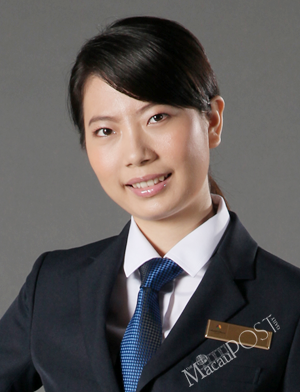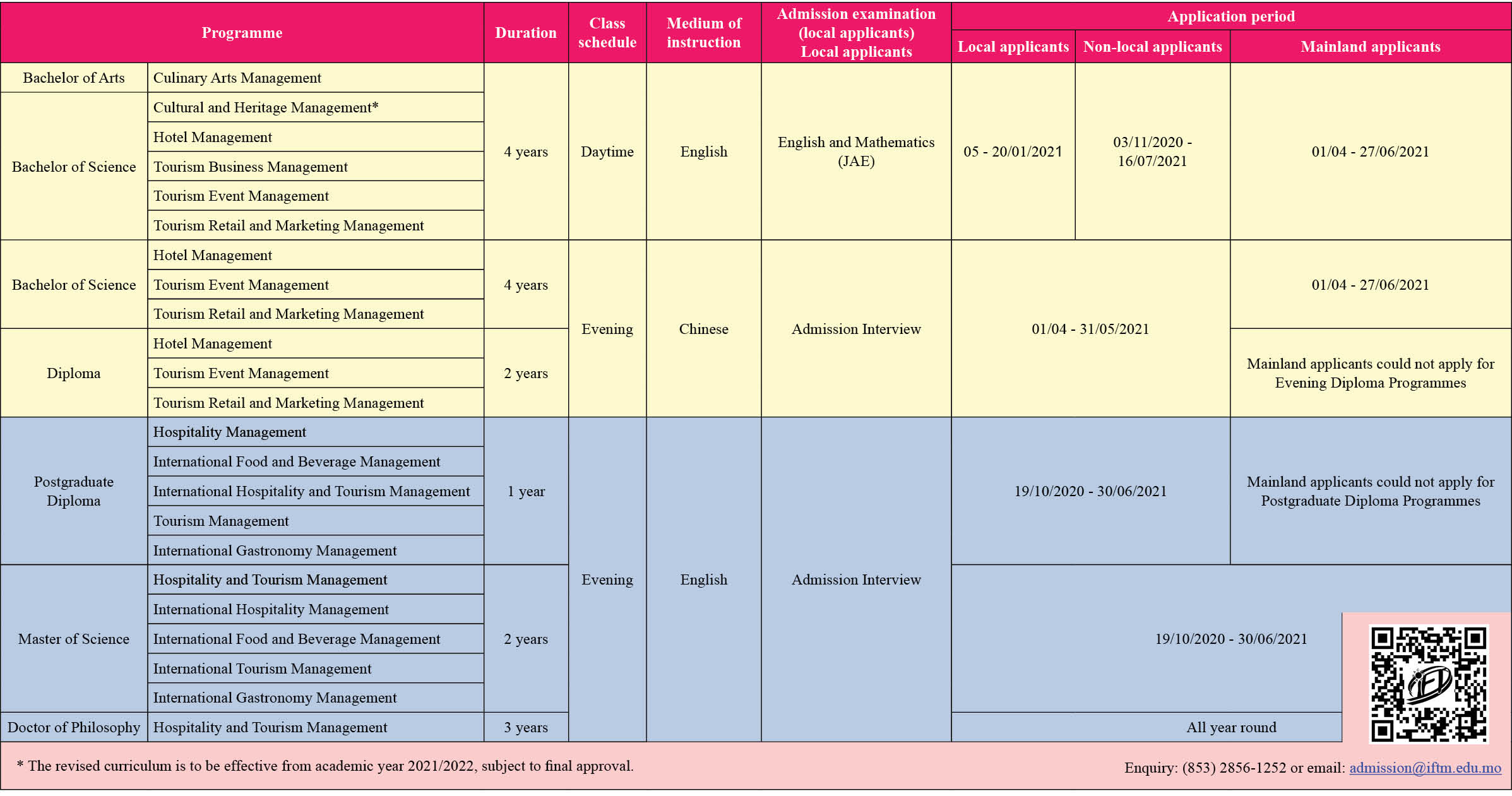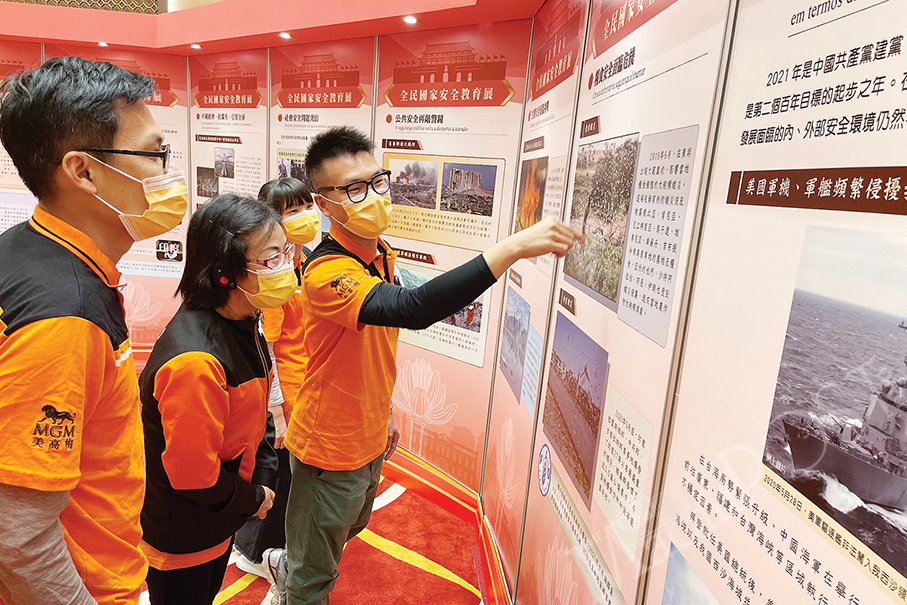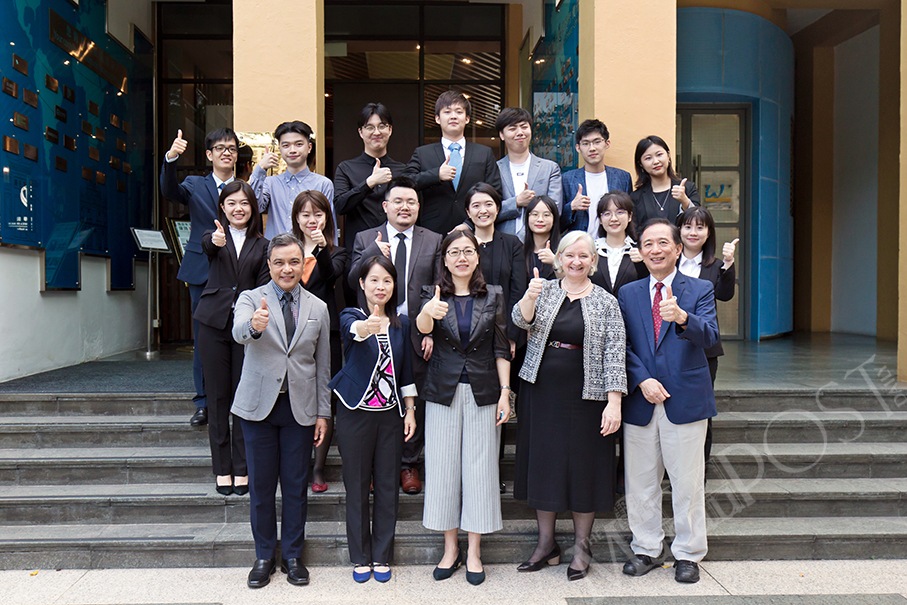
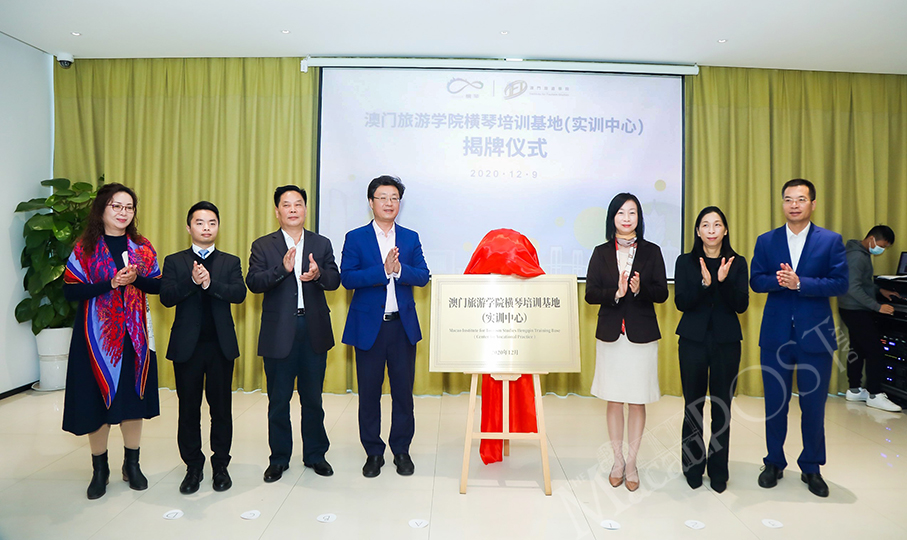
Advertorial
The Macao Institute for Tourism Studies (IFTM) has grown over the past 25 years, during which it has had many great achievements in many areas, receiving international recognition for its quality of education and acknowledgement in tourism and hospitality sectors around the world.
In response to the rapid development of Macao’s tourism and hotel sectors in the past decade, IFTM introduced programmes and training courses to continuously nurture professionals to serve the thriving industry, in support of the government’s preparation to advance the city as a “World Centre for Tourism and Leisure”.
Over the last five years, IFTM has expanded its campus and increased the number and choice of programmes.
Besides the existing Mong-Há campus on the peninsula, new teaching facilities have been added to the Taipa campus, enhancing and optimising students’ learning environment.
On the academic front, the institute is offering more programmes with an improved level of schooling with the introduction of postgraduate and doctoral programmes in 2019, making for a comprehensive higher education institution.
This range of learning options helps satisfy the needs of students who are constantly looking to broaden their knowledge and improve their expertise, as well as meeting the demand for professionals in the tourism industry.
In May last year, the IFTM Council was established after a revision of the IFTM Charter. The Council’s first meeting has established the Institute’s future development plan, making clear its path ahead, including making good use of land reserves allocated to the Institute by the government, co-ordinating with Macao’s position in tourism development, engaging in the Guangdong-Hong Kong-Macao Greater Bay Area (GBA) and Belt and Road Initiative (BRI) development, nurture talented people with national sentiment, and promote “smart campus” facilities.
The Council also said that the Institute would continue to raise the quality of its teaching and research and administration efficiency, integrate resources to nurture talents for the GBA, and carry out the realisation of GBA to become a world-class tourist destination.
Following the signing of a strategic cooperation framework agreement signed between IFTM and Hengqin New District Management Committee in 2019 on the construction of the IFTM Hengqin Training Base to establish a benchmark for talent training of the leisure tourism industry in the GBA, the Macao Institute for Tourism Studies Hengqin Training Base (Center for Vocational Practice) was officially opened last month.
Located in Xingledu Hengqin Camping Town, the center would bring more exchanges between Macao and Hengqin in training and setting service standards, which would efficiently lead tourism service in Hengqin to international standard.
IFTM President Dr. Fanny Vong said that she hopes through the center, education resources accumulated in Macao’s tourism and related industries could be shared with industry partners in the GBA.
Recently, IFTM, Guangzhou Municipal Culture, Radio, Television and Tourism Bureau and Guangzhou Lingnan International Enterprise Group jointly introduced the Macao Occupational Skills Recognition System (MORS) to Guangzhou, and held the first course in LN Garden Hotel in Nansha, Guangdong, last month.
Vong said that IFTM launches occupational courses according to market needs, with training content geared towards the industries’ needs, as a way to serve the city’s economic infrastructure.
She said that through the effort from the government, the education institute and the enterprise, she hopes MORS would set the standards for occupational skills in order to raise the service quality and competitiveness of GBA’s tourism industry.
It was also last year that the Silver Jubilee Building in Taipa was officially opened. The government early last year approved the allocation to the IFTM of the building to be used as a teaching facility.
With a strong foundation and achieving overall global recognition, IFTM will further enhance the establishment of the Tourism Education and Training Base for the GBA, and continue its collaboration with the United Nations World Tourism Organisation (UNWTO) to promote the development of the Global Centre for Tourism Education and Training.
At the same time, IFTM will strengthen its teaching and research quality, expand its global partnership network, continue raising its administrative efficiency and improve its campus environment.
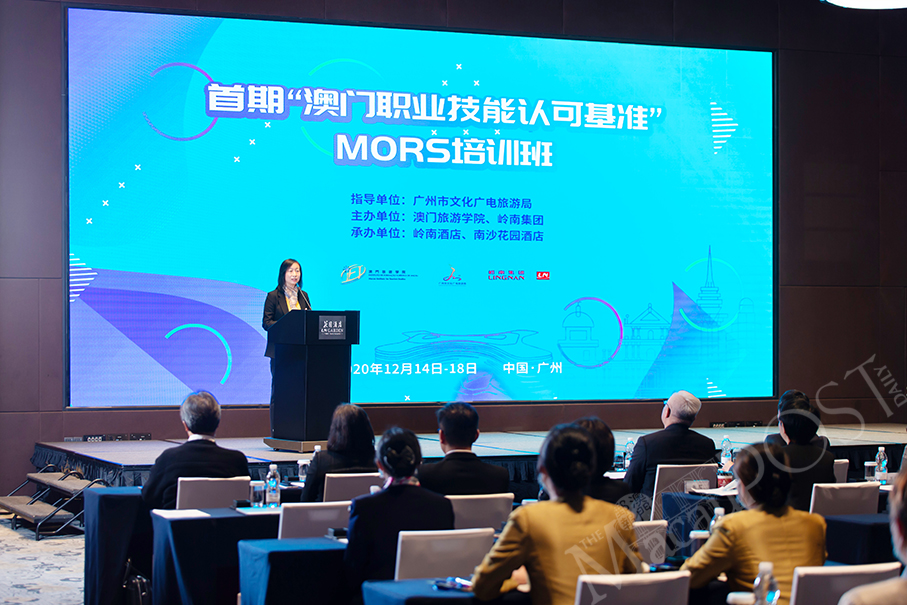
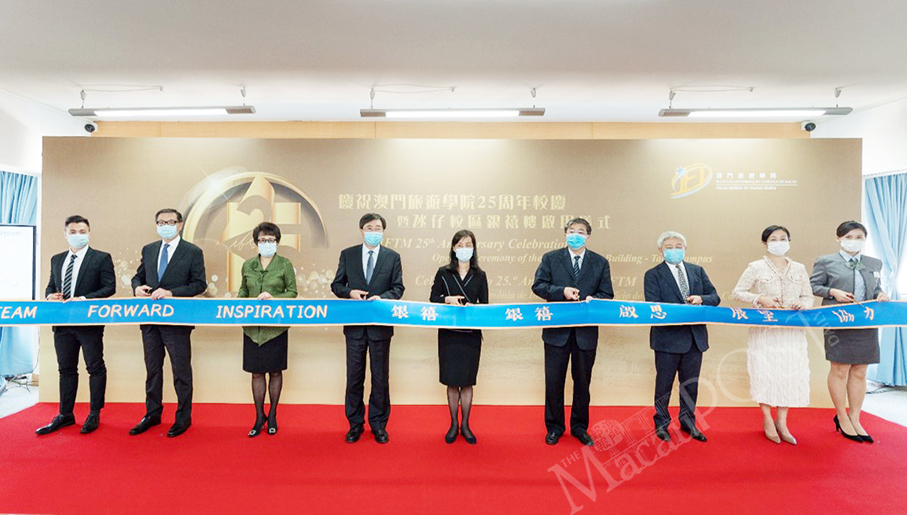
Learning continues during COVID-19
The COVID-19 outbreak has caused an economic impact in Macao, affecting the local workforce. To support local residents who have either lost their job because of the pandemic or certain work groups, the Labour Affairs Bureau (DSAL) has launched the “Subsidised Training Programme” where residents can learn new skills as a way to increase their employability.
To coordinate with the government, IFTM rolled out courses from April to July last year comprising Chinese and Western Restaurant Service, Hotel Front Office Operations, Hotel Security Operations” and Hotel Housekeeping Operations, which saw an enrolment of 207 students.
Last September, the Institute introduced an on-the-job training programme for the government’s “Subsidised training plan for technical skills enhancement” that is geared for local employees, the self-employed and business operators. The courses, ranging from Food & Beverage, Cultural Heritage and Tourism, Retail and MICE, Creative Art and Science Technology, Health and Beauty and Language and Culture, have so far received 427 enrolments, with a capacity of 800.
In addition, the Institute has launched a course on “How to set up and open a restaurant” designed for those who are looking to get into the restaurant business, allowing students to understand the essentials of opening a restaurant from planning to full operation, define food concept for the restaurant and design restaurant menus, with insights from experienced restaurateurs.
These courses are expected to continue until the impact caused by the pandemic on society is alleviated.
IFTM continued its GBA training programmes last year with online classes, with over a dozen seminars on hospitality, tourism, tour guide training in tangible and intangible heritage, culture, regional tourism strategies, tourism goods and services, accumulating about 2,500 people in online attendance.
The Institute’s MORS (Macao Occupational Skills Recognition System) courses were also moved online, including working with their academic partners in the mainland to carry out the evaluation process online, and so far, occupational skills recognition tests are available in the front desk service and customer relations categories.
MORS was launched in 2001 with the aim of upgrading human resources in the Macao tourism industry through the introduction of a certification scheme for a number of professions. In recent years, IFTM began its partnership with vocational schools in the mainland to provide MORS training.
In order to expand its influence in the GBA and increase the training courses’ efficiency, IFTM is making the MORS training manual, videos and other teaching materials available online to offer flexibility and convenience for students.
Moreover, the training would put more focus on “train the trainer” in more and different categories, equipping them with the qualifications to train more students and employees.
All written exams were held online too, so that students can receive their results immediately. MORS courses that are currently available online include Bartender, Room Attendant, Front Desk Agent, and Waiter/Waitress for Chinese Restaurant Service.
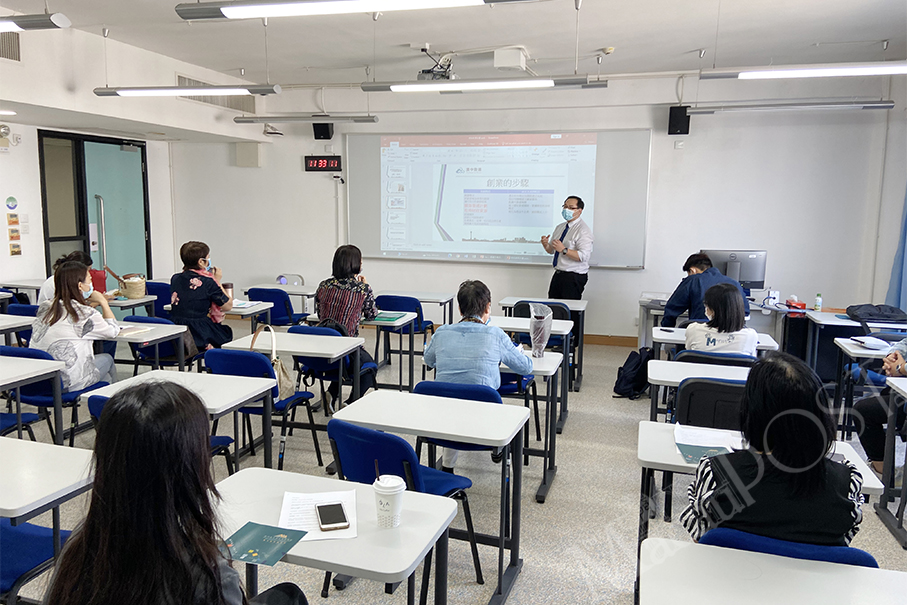
Study should be fun to be effective: IFTM scholar John Ap
With an academic career spanning almost three decades, IFTM Visiting Professor Dr. John Ap is a firm believer in the need to complement textbook teaching with field trips and activities that can stimulate assimilation of knowledge, especially in tourism education.
“Teaching and learning shouldn’t be boring,” said Dr. Ap, adding, “As educators, we should make learning fun.” That, according to him, starts by scholars ensuring they also have fun in the teaching process.
For the undergraduate and postgraduate courses he teaches at IFTM, he regularly organises excursions to theme parks in Hong Kong and Hengqin Island, as well as field trips to Thailand and Malaysia.
The underlying goal of such an approach is to go beyond textbook-based teaching, to enable students to understand how the tourism industry actually operates.
“We can teach the knowledge and the theory, but we must relate what we teach to the real world,” he said, “People learn more by seeing and doing. That’s a fundamental premise upon which I do my teaching.”
He has been providing his expertise in tourism education to IFTM since 2016, and has been the director of the IFTM Global Centre for Tourism Education and Training since its inception also in 2016.
The centre, with the aim of providing programme participants with theoretical knowledge and hands-on perspectives from the industry, has so far hosted 33 programmes, attended by 400 participants from 34 countries and regions.
“What I’ve found as an educator is that you can talk within the walls of a classroom, and what you say might go in and out of the ears of your participants,” Dr. Ap said, “But when you’ve given them the knowledge and the theory, and then you take them on a technical visit, and you point out the things you have been talking about, it’s easy for them to remember and to learn.”
Entrepreneurship education equips and empowers students
Over the years, entrepreneurship has become one of the key agendas for government’s strategic plans as well as being integrated in every level of the education system because it not only contributes to economic development and job generation, but also stimulates innovation and equips students with survival skills.
IFTM Assistant Professor Dr. Fernando Lourenço, who helps the Institute integrate entrepreneurship into the courses, said that besides preparing students to contribute to the labour market with their specialised skills and knowledge, tertiary education should also be able to empower students so that any graduate from any discipline has the ability to start or run a business.
“For this reason, in this day and age, our education system and higher education institution cannot ignore the importance of entrepreneurship to students. This is the reason IFTM have integrated entrepreneurship in every degree programme,” he said, adding that entrepreneurship education is a more dynamic approach and full-person development.
“Any kind of knowledge is static. Only when we are able to use knowledge, its potential to become useful enhances,” he added, pointing out that apart from the traditional lecture-based method, hands-on approaches are at the centre of the education philosophy.
“I have a particular approach which I apply at IFTM. This approach aims to bringing five-wins to various stakeholders by integrating consultancy projects for real-world clients in my courses,” he said.
Dr. Fernando introduces the five-wins (5W) in his teaching philosophy, by integrating consultancy projects for real-world clients. Firstly, the project provides real world experience to students and this can improve their CV (1W). The project must generate valuable outcomes to the clients (2W). When students and clients gain, the quality of the teaching and the degree programme at IFTM improves (3W). This will boost up the overall quality of the school (4W) and this will bring positive impact to Macao SAR (5W).
Since 2013, he has identified hundreds of opportunities for real-world consultancy projects for students that also benefited the clients, and his students have started up business in retail, F&B, pest control services, education tutoring services, music production, marketing and gyms.
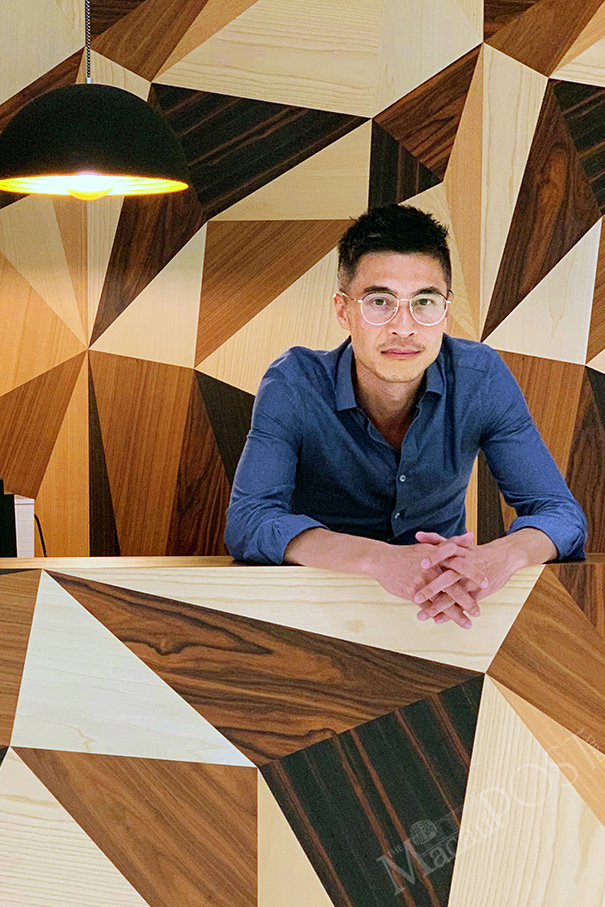
Entrepreneurial knowledge proves a solid foundation for start-ups
Having graduated from a bachelor’s degree programme in hotel management at IFTM in 2015, Momo Zeng Huadi worked for two years and now runs two business start-ups – an interior design company and a popular tofu drink brand.
He said that besides knowledge, IFTM has also given him a wide range of practical opportunities, allowing him to put theory into practice, complemented with management skills, he said that he was able to get a comprehensive understanding of hotel or even business operations when he graduated.
He said he also went into further studies, where he developed business analytical skills so that he can efficiently solve problems when they arise during his path as a young entrepreneur.
“The hardest part is taking the first step,” he said on starting a business, pointing out that setting a clear goal and being determined would get one closer to one’s dream.
“You need to take in considerations all the possible risks when you start a business, you need to keep reviewing the problems and find solutions,” he said, “Limiting yourself is like giving up your chance to fly.”

Interpersonal skills learnt in IFTM useful in different sectors
Having worked in the hotel sector for a decade after graduating from IFTM, Jacinta Chau Wai Peng is now overseeing a social enterprise that offers employment and on-the-job training opportunities to people with intellectual disabilities through art and creativity.
Chau said that both hotel and social enterprise work requires a close relationship with people, and IFTM is where she learnt her interpersonal skills.
She said that there were plenty of on-campus and off-campus events and activities at IFTM and she had the opportunity to be part of the team to carry out those projects.
“It was those real-world practices that opened my eyes to the importance of building good relationships with people, which is positive for work and also for my personal development,” she said.
The interpersonal skills not only came in especially handy when she worked in the hotel sector that required good communication between many departments, businesses as well as customers and guests, but also very helpful in social and rehabilitation services, which have gained great support from major enterprises to help build a future for people with disabilities.

Course field trips help boost critical thinking skills
Attracted by IFTM’s reputation, rich education resources, wide network and a teaching philosophy that combines theory and practice, Alex Wu Qitao, a Year 4 student in the Tourism Event Management degree programme, said that field trips and on-site learning in particular has helped boost his critical thinking skills.
“I have participated in different field trips led by lecturers and IFTM,” Alex said, “[They] enable me to apply what I have learnt in class to reality and develop my critical thinking through the field trips.”
He has also been on an exchange programme at Bournemouth University in the UK where it inspired him to voice his opinions during seminars, which in turn encourages others to think and share each others’ views in a discussion.
Alex said having done two internships in marketing and public relations, he would like to work as an event planner when he graduates.
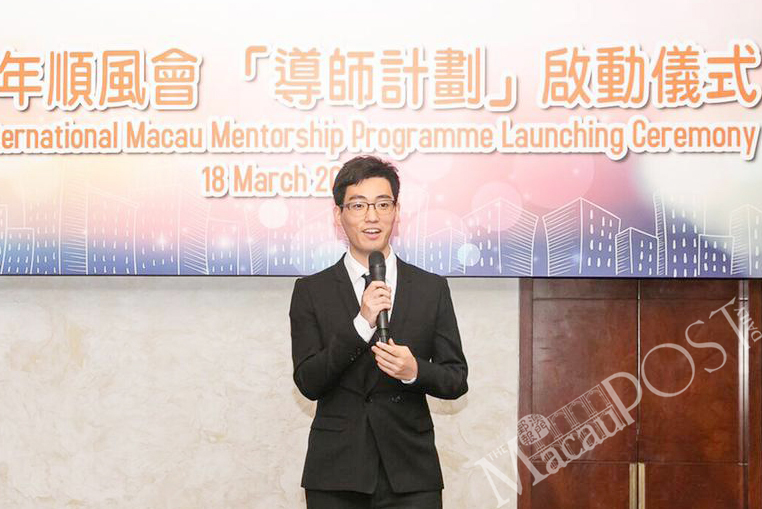
Internship further clarifies career path
Currently studying IFTM’s four-year Hotel Management degree programme, Julie Lee Areum has recently completed her six-month internship in the Maldives.
Besides the real-world situations learnt in classes, Julie said that she has gained valuable experience from working as a butler during her internship, especially having learnt and practiced psychological approaches so to provide a quality guest experience.
“A graduate with a hotel management degree has multiple career options, such as the [different departments] front office, food and beverage, housekeeping, but through this internship, it helped me realise which job suits my personality and talents, therefore, it helped me clarify which path I should commit and pursue once I graduate,” she said.
Julie said she would have liked to be working on a world cruise liner or a hotel or in another country, but the pandemic is making it difficult.
“I’d say I hope to see myself getting hired for a job I desire not too long after I graduate,” she said.

Master’s programme highly applicable and practical
IFTM’s postgraduate student Wong Hoi Ham said that although COVID-19 outbreak has brought a huge impact on the tourism industry, Macao should look for opportunities when faced with the challenges.
Wong said he learnt about the Institute’s Master’s programme in the summer of 2018, offering him an opportunity in further studies.
For Wong, the year in postgraduate education has helped him improve independent thinking and make use of science in his research.
Wong said that the programme was well organised and clearly planned, with highly applicable and practical for the industry, which is an advantage in achieving research results relevant to the Macao market.
With IFTM being a tourism training base for the GBA, Wong said he hopes his Master’s studies would open more opportunities in his profession, and at the same time he is preparing for his Doctoral degree at IFTM.
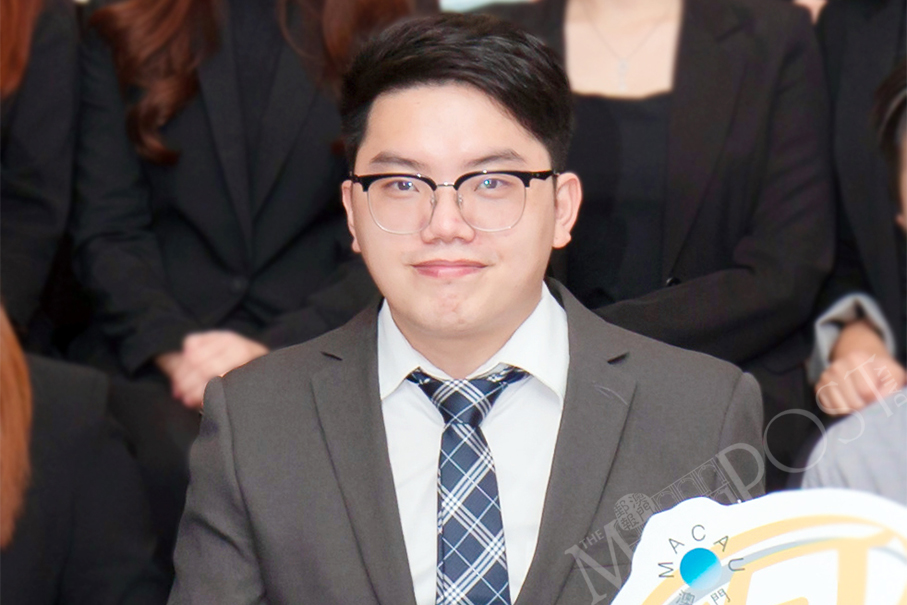
Doctoral programme in line with international practice
PhD student Sophia Zhou Huizhi said that she finds IFTM’s tourism education particularly professional.
Zhou said the courses are in line with international practice, allowing students to expand their perspectives, and also integrate well with the industry, providing students with insights and expertise from industry players and relevant training.
For example, she had the opportunity to participate in last year’s Global Tourism Economy Forum (GTEF).
As a student in the Doctor of Philosophy in Hospitality and Tourism Management course, Zhou pointed out that the library had many resources that were helpful as she’s doing her research paper on “The influence of collective memory on place attachment”.
She said the Institute every week has new research achievements to enrich students’ knowledge on other disciplines, which she finds motivating.
There are also regular seminars and workshops in different fields, which is favourable for exchanges and expanding perspectives.
Each PhD student at IFTM is assigned with two course instructors to provide assistance and guidance in their studies.
Zhou said that during the virus outbreak when she couldn’t go to the campus, her course instructor arranged weekly online meetings to ensure that her studies are going in the right direction.
“Under my instructors’ guidance, I’m very satisfied and confident with my PhD studies,” she added.
